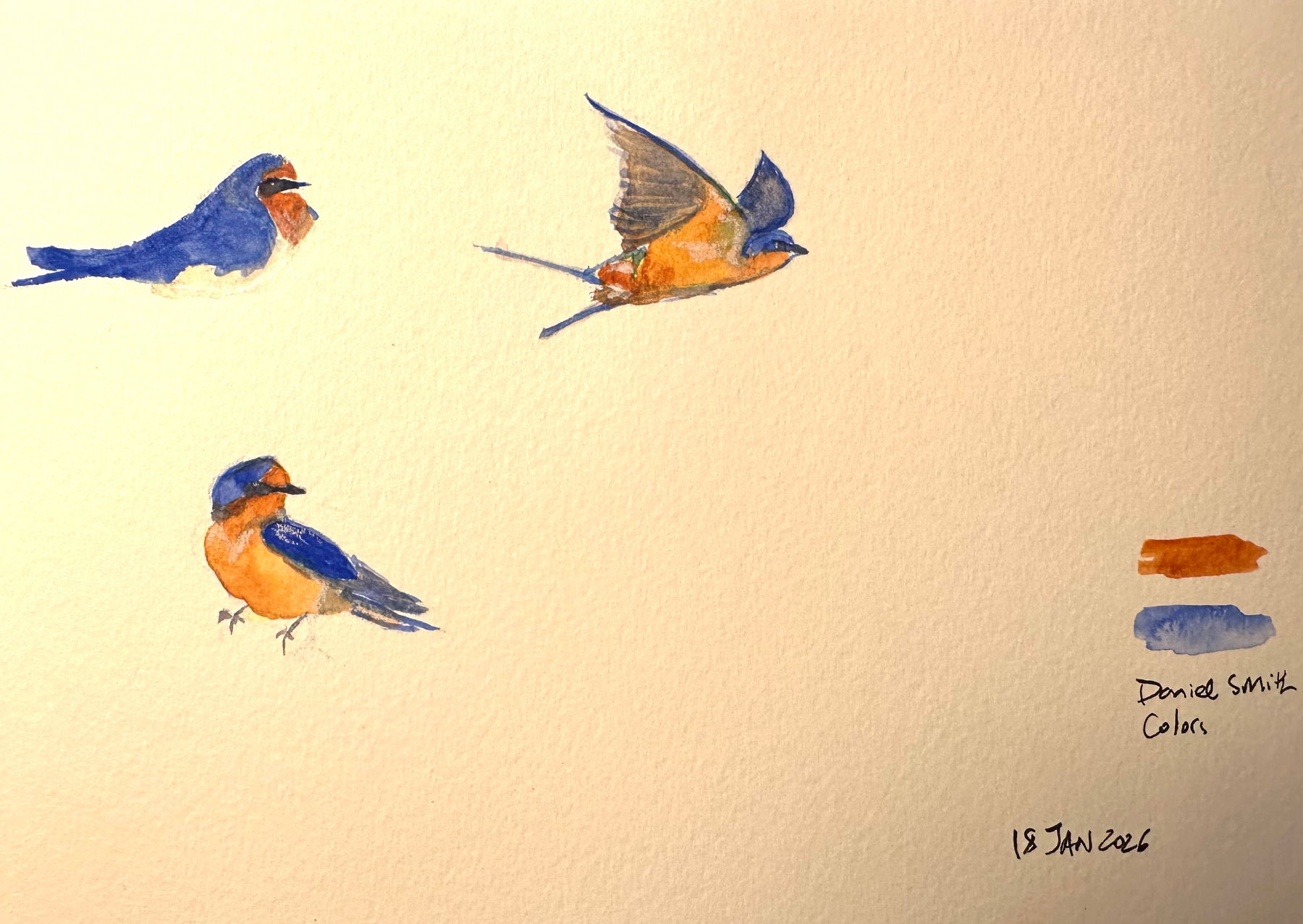Today’s shelfie. Lots of meetings, fewer books.
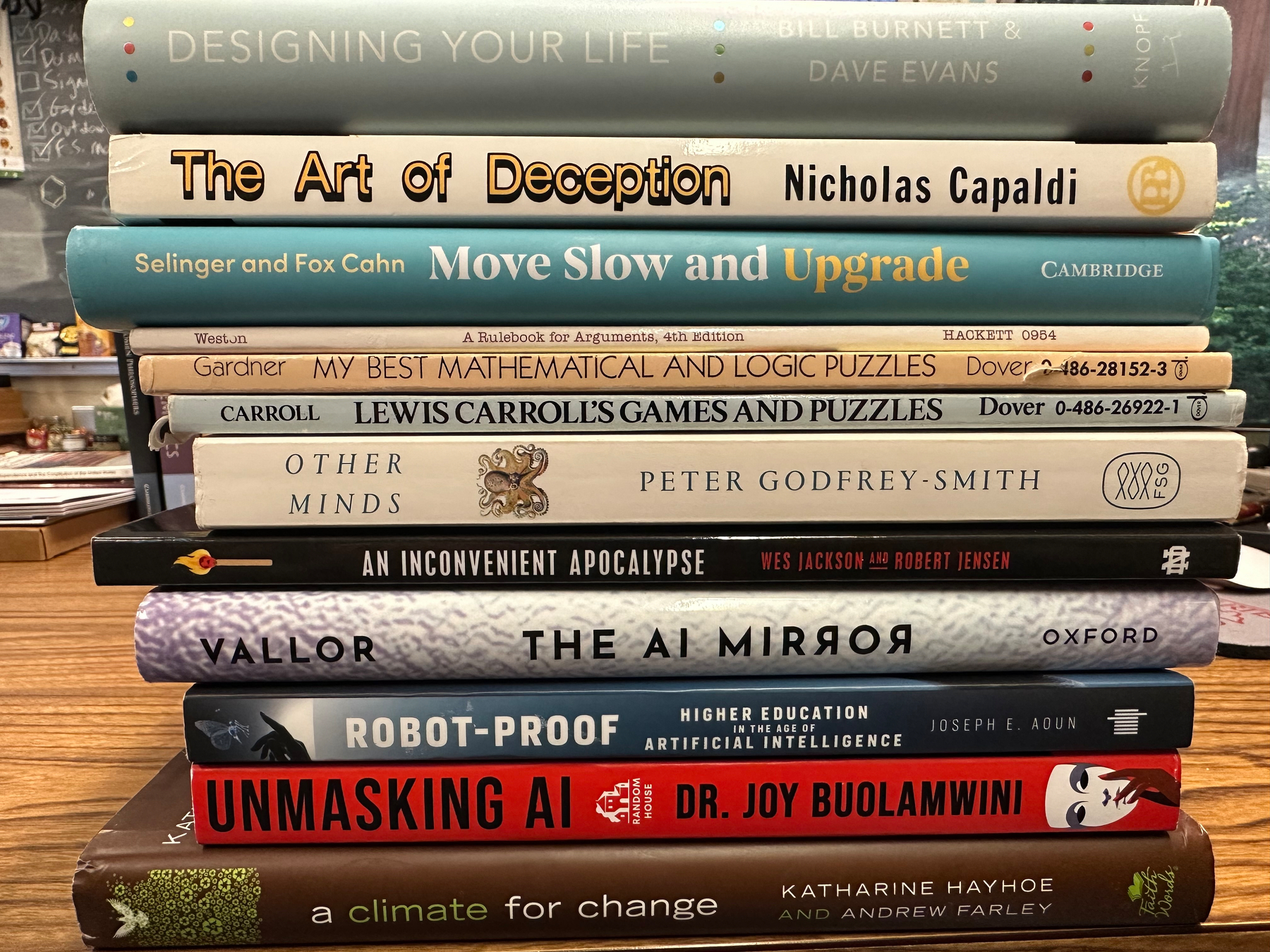
My day in books. Today’s shelfie.
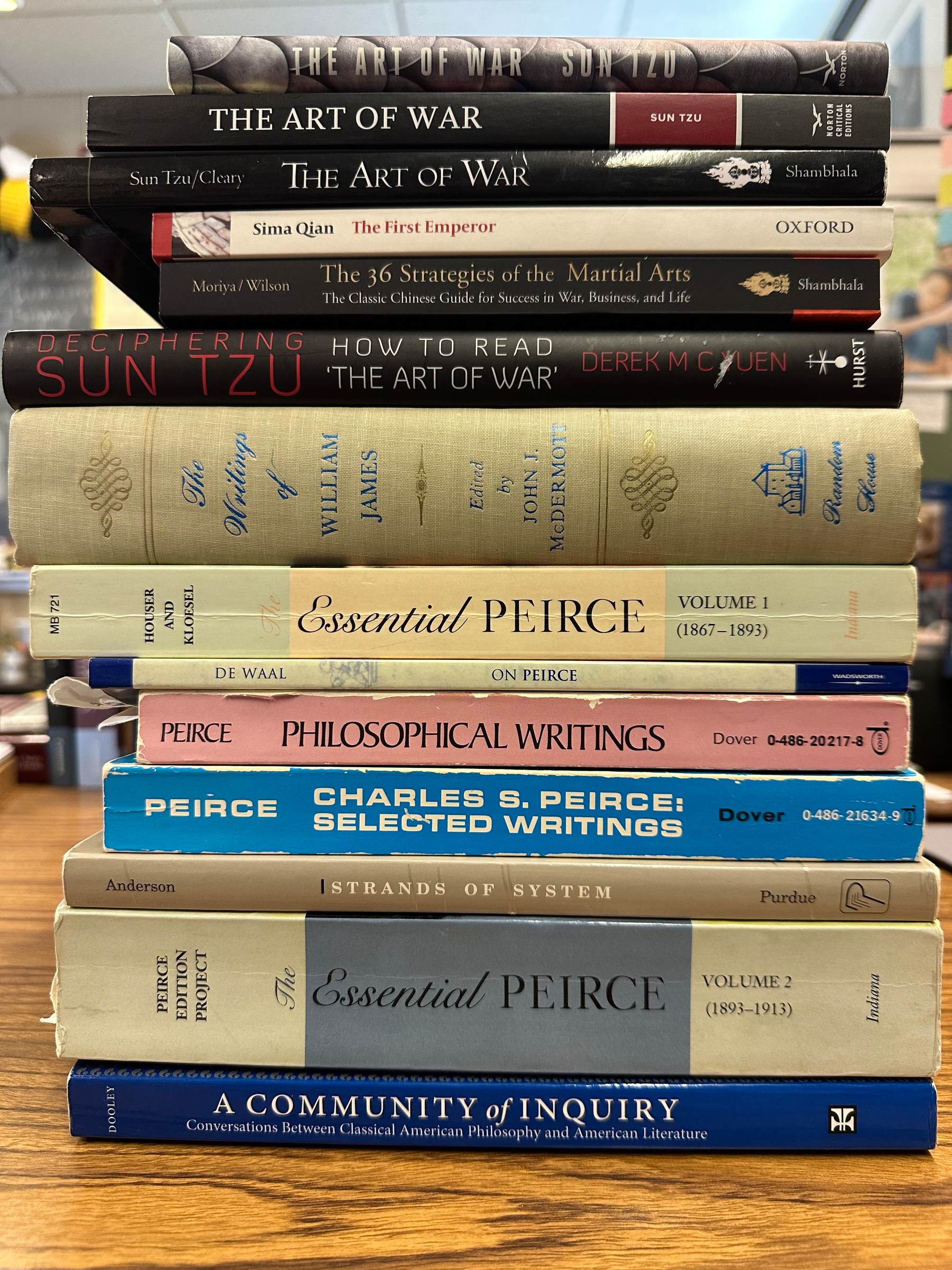
Asphodel in Tiryns
One more morning Greece-themed sketch: asphodel flower. (Asphodelus ramosus)
I photographed this one on the ruins of Tiryns, not far from Nauplion, in Greece. These are some places I love to visit. Nauplion is worth visiting for its own sake. Many who go there of course visit Mycenae and Epidaurus, and the Palamidi fortress and other major archeological sites, but Tiryns and Lerna are nice because so few tourists visit them. They’re quiet, surrounded by orange groves, with the smell of the sea in the air.
The asphodel is associated with gravesites, and with the underworld, and with memory of the dead. Some have said it can heal snakebites (I don’t recommend testing this theory without a backup plan.)
I associate it with Greece, a country full of gentle blossoms.
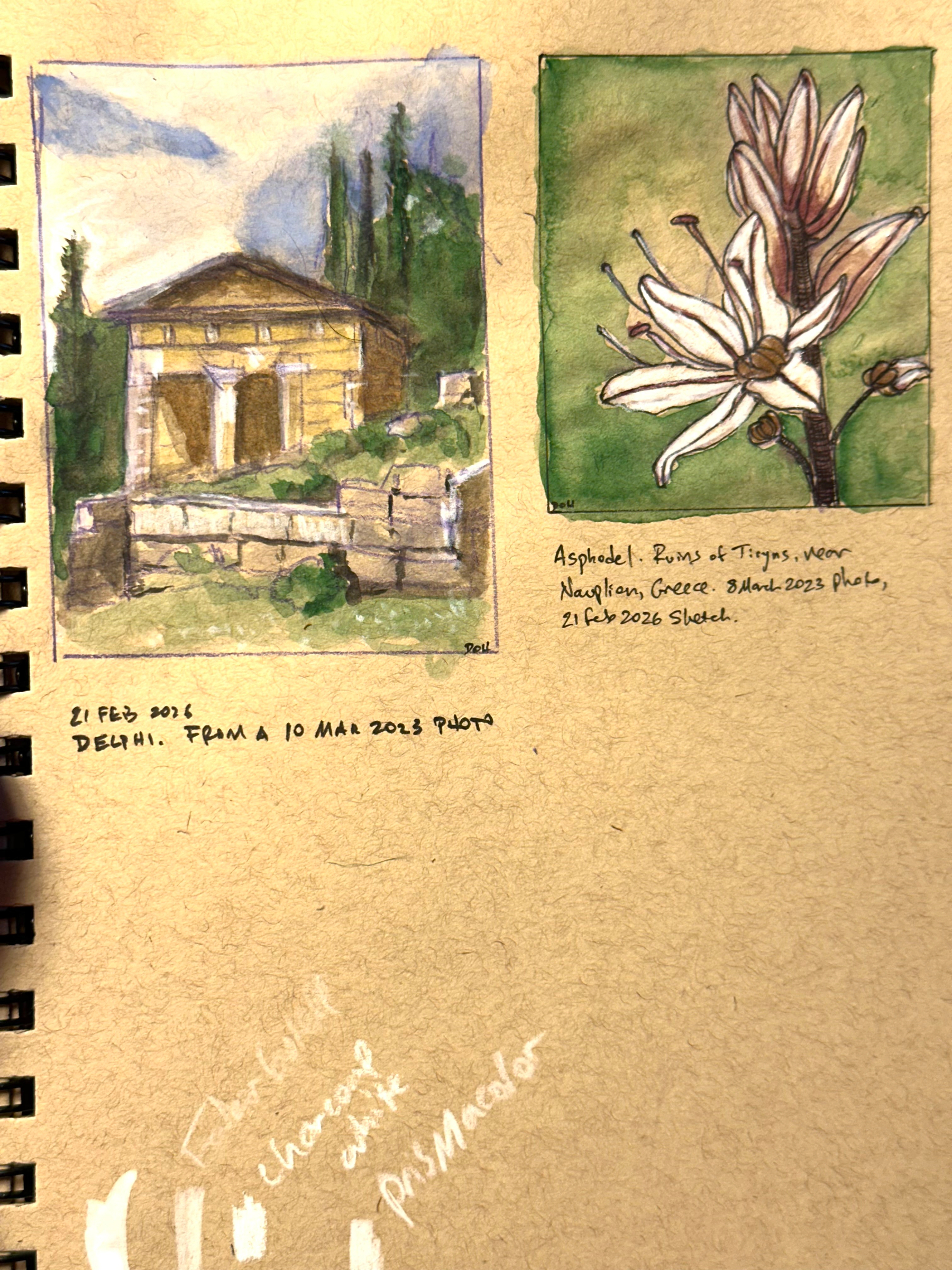
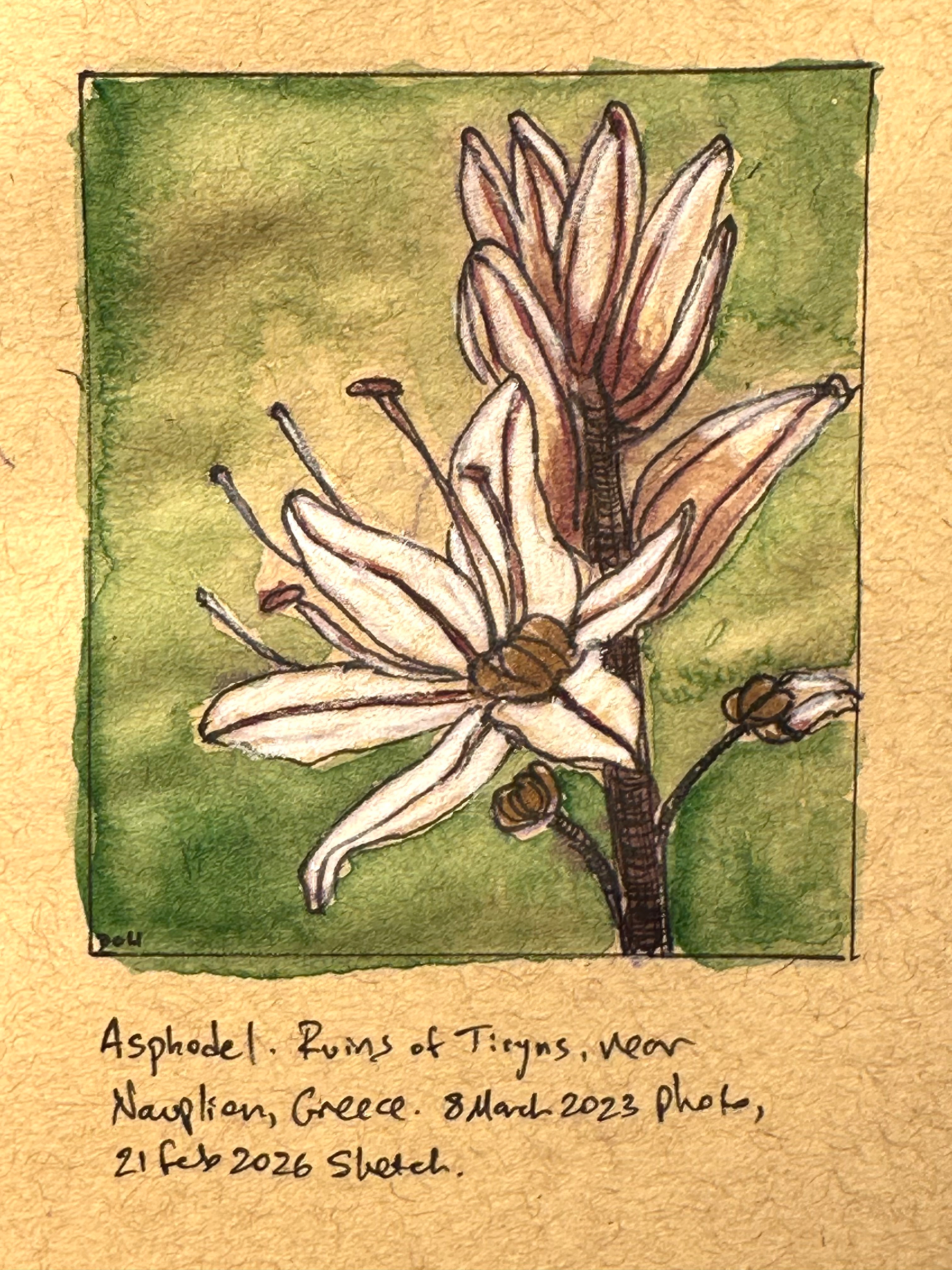
Delphi Treasury
Part of my morning discipline: get a little better at sketching and painting every day.
I’ll be taking students to Greece again in a few weeks, so I’m going over some photos from previous trips and thinking about color and light.
Is any sky so blue as in Greece? Maybe, but the blue skies there are painted on the walls of my heart’s restful chambers.
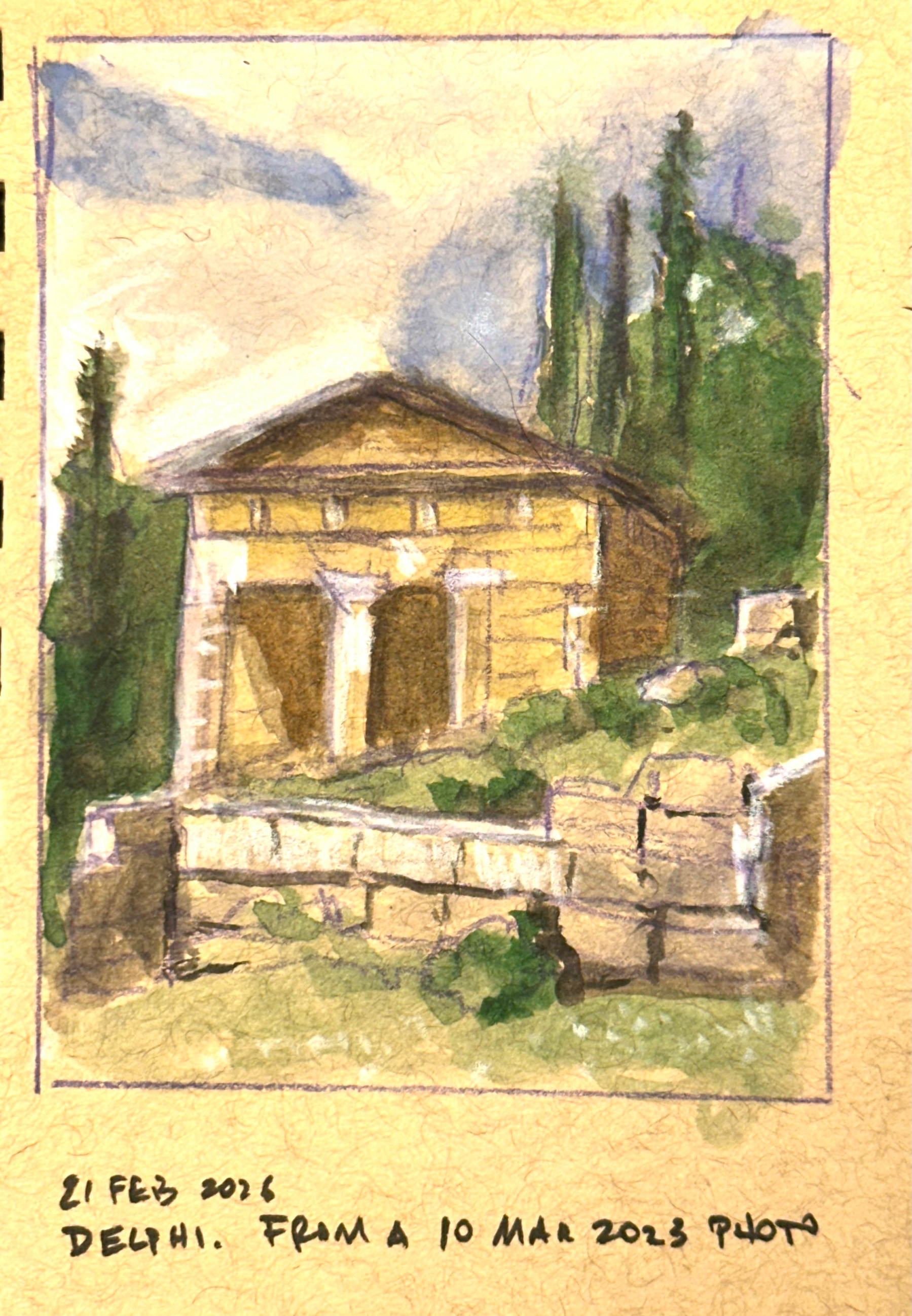
Contemplation
Cal Newport asks, in the Chronicle of Higher Education, whether email is making professors stupid. Frictionless communication comes at the expense of long stretches of uninterrupted thought. Some of the practices that make me a better scholar and teacher:
- writing letters by hand;
- walking (strolling, perambulating, sauntering—not merely moving my body to the next meeting) outdoors;
- reading deeply and broadly;
- carrying paper and pen, and taking notes, and then reflecting on those notes and refining them later;
- making time for art;
- prayer, singing, worship;
- contemplation, conversation, and commentary. I’m not aiming for what is so often vaunted as “efficiency.” I am far more interested in doing a few things well. (Vaunting afterwards, or during, is optional, and need not be online.)
My friends often hear me return to this word “contemplation.” I think of it as what precedes good conversation. The word can sound antiquated and slow in an age that cherishes speed. But some things shouldn’t be rushed.
The word has echoes of time in a temple, in a sacred space that invites us to move slowly, to consider our smallness in a great cosmos. The columns of a cathedral draw one’s gaze upwards like boles of ancient trees. The act of looking up slows our feet, and even helps us to stand still, lest we tumble into a well like ancient Thales.
The street outside, the space outside the temenos, can bustle on. It will still buzz and hum when we return to it. For now, read slowly. Drink deeply. Listen quietly. All of this is preparation. It looks like inefficiency because you are not moving fast. But the best runners take time to prepare their muscles for the race, and while they are preparing they are often still. To run without ceasing is not efficient; it is self-defeat.
We will all devote ourselves to something. Something will be the object of our affection. That affection will be shown by how we inhabit the moments of our days, (by how, as we often say, we “spend” our limited allotment of time.) Worship—acknowledging something as worthy of our time and attention, or worth-ship— is not optional. The only choice is who and what receives our attention.
Dorothea, and you, and me
Here are the final words of Middlemarch, words I have often returned to:
“Her finely-touched spirit had still its fine issues, though they were not widely visible. Her full nature, like that river of which Cyrus broke the strength, spent itself in channels which had no great name on the earth. But the effect of her being on those around her was incalculably diffusive: for the growing good of the world is partly dependent on unhistoric acts; and that things are not so ill with you and me as they might have been, is half owing to the number who lived faithfully a hidden life, and rest in unvisited tombs.”
Eliot touches on this earlier in her book as well. Here is a passage from chapter 41:
“Who shall tell what may be the effect of writing? If it happens to have been cut in stone, though it lie face downmost for ages on a forsaken beach, or “rest quietly under the drums and tramplings of many conquests,” it may end by letting us into the secret of usurpations and other scandals gossiped about long empires ago: —this world being apparently a huge whispering-gallery. Such conditions are often minutely represented in our petty lifetime. As the stone which has been kicked by generations of clowns may come by curious little links of effect under the eyes of a scholar, through whose labours it may at last fix the date of invasions and unlock religions, so a bit of ink and paper which has long been an innocent wrapping or stop-gap may at last be laid open under the one pair of eyes which have knowledge enough to turn it into the opening of a catastrophe. To Uriel watching the progress of planetary history from the Sun, the one result would be just as much of a coincidence as the other. Having made this rather lofty comparison I am less uneasy in calling attention to the existence of low people by whose interference, however little we may like it, the course of the world is very much determined.”
Sometimes there are people who are “low people” — mean, cruel, selfish, unkind — whose actions and words add up to horrible things that should be beyond the power of any one person to bring about. The little things, like little seeds, can grow into very big things.
I remain hopeful that even where there are tyrants and would-be tyrants, in the long run it is the steadfastly kind person, the one who knows that “all flourishing is mutual,” the prayerful pastor standing in the streets to be arrested on behalf of the downtrodden, the prayerful grandmother alone in the small dark hours, the person who offers an encouragement to someone who needs it right now, the faithful hobbit—the people who seem unimportant to the writers of history and to the halls of power—who are steadily building a better future for others.
I don’t mean to say everything is working out fine, just be patient. I do mean to say that when I wonder whether that cup of tea and half an hour of my time offered to a crying student really makes a difference, especially when I have reports due and meetings to attend, etc; when I wonder about all of that, words like Eliot’s remind me why I do what I do, and encourage me to keep trying. I won’t save the world, but I can make it better for some of those who come after me.
And so can you.
—George Eliot, Middlemarch
Often when we write — and especially when we write by hand, the slow work of pen on paper — words and ideas come forth that we did not yet know were latent within us.
Our souls are word-seed banks full of years-old seeds awaiting the light of day.
Today’s shelfie. Books that came off the office shelves for the purpose of teaching and in conversation with students. A good day, and a full one.
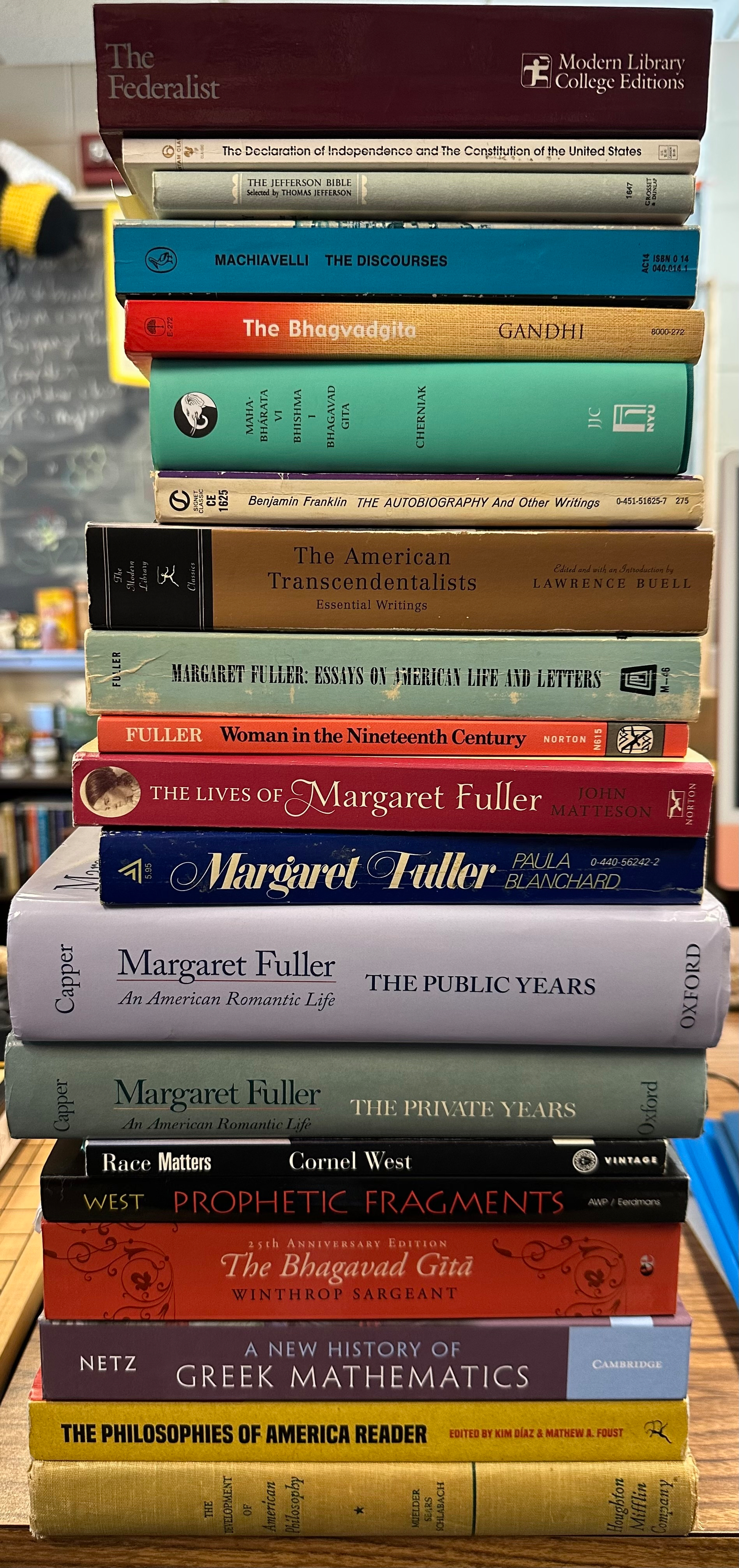
Sent a book manuscript to my publisher today and it feels really good. Now on to the next book!
The Deer Mouse, The Mountain, and The Road to Mastery
Deer mouse on our bird feeder yesterday, and sketched in my journal.
The mouse-sketch came after writing about two books I’ve read this past week, Nicholas Triolo’s The Way Around, and Gary Snyder’s Mountains and Rivers Without End.
Triolo mentions Snyder, in particular his poem about “The Circumambulation of Mt Tamalpais,” in his book—which is also about circumambulation and which makes explicit reference to Snyder’s poem.
After reading these two books I started writing some stream-of-consciousness poetry about where our clean water comes from and where it goes. These are things I think we don’t pay enough attention to.
After writing that poem as a draft I returned to it to see if there was anything good in it. (Sometimes there is! But not always.)
I found in it the inkling of a haiku, so I wrote the draft of the haiku several times.
Each draft was poor, awkward, clumsy.
Which is fine.
You don’t suddenly become a master of haiku.
You get better by trying, failing, observing, reading, watching others at work, getting criticism, trying again.
Ora et labora. Repeat.
Try. Err. Stumble. Pray. Try again. Pray again.
Try with rigor and with periods of rest.
Contemplation, conversation, commentary.
I am not a master of haiku. I have written and published a little poetry but not much.
Lately I have been focusing more on sketching and painting. Observing small lives, small details.
So after the poem I returned to the mouse.
Normally I begin my sketches with pencil. Maybe non-photo blue, or light graphite. Then I can erase the sketch once I have gone over the best parts with ink.
But I have been practicing a lot, and this week I have often begun my sketches with ink.
I am not a master, but after lots of practice I worry less that this sketch will fail. As Henry Bugbee says, “get it down.”
So I am getting it down. If I mess up (I will!) I will repeat. Or try another.
And I will keep learning.
The road to mastery is not a day trip.
It is “a long obedience in the same direction.”
But I am learning that the road itself, even if I never complete the walk, is beautiful every step of its circumambulatory and peripatetic way.

For the Grandchildren
Each week I try to write something in the books I am making for my grandchildren.
Sometimes I tell them stories about the family.
Other times I tell them what I am learning and seeing in the world.
They’re very young, so I haven’t the heart to tell them in these books all that I am seeing. I’m writing that elsewhere, for when they are older.
For now I am trying to share the good and the beautiful and do speak truth in love, hoping that it will make a difference for them as they do the hard work of loving their neighbors as themselves. All their neighbors.
I often think of Gary Snyder’s poem, “For the Children.”
I share that one with my students pretty often, especially when we are spending a week trekking through the rainforest or across the tundra.
Those last words keep ringing in my ears:
“Stay together / Learn the flowers / Go light.”
These are things we all need, I think.
So I am sharing the little I have, and hoping that it will grow.
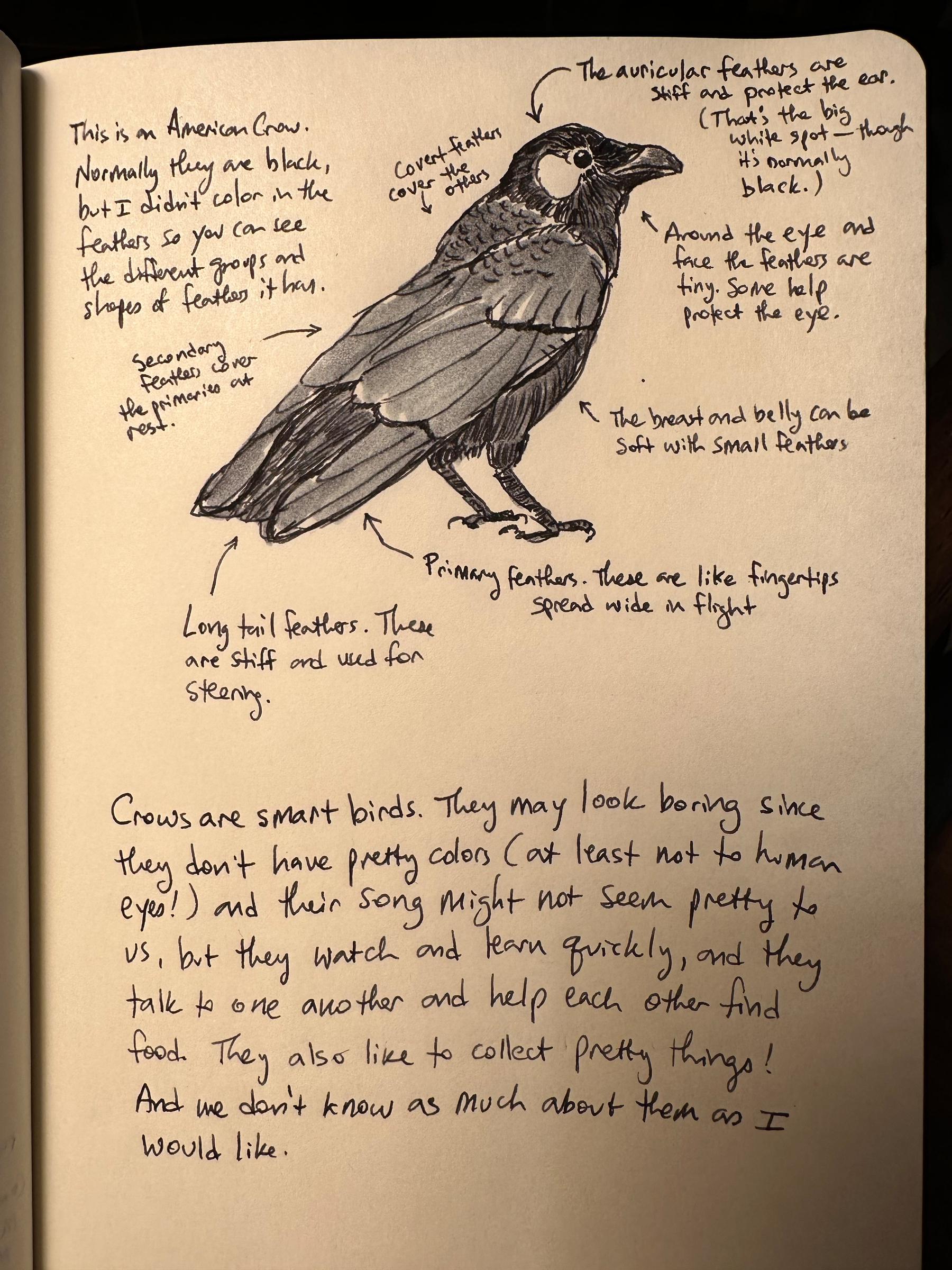
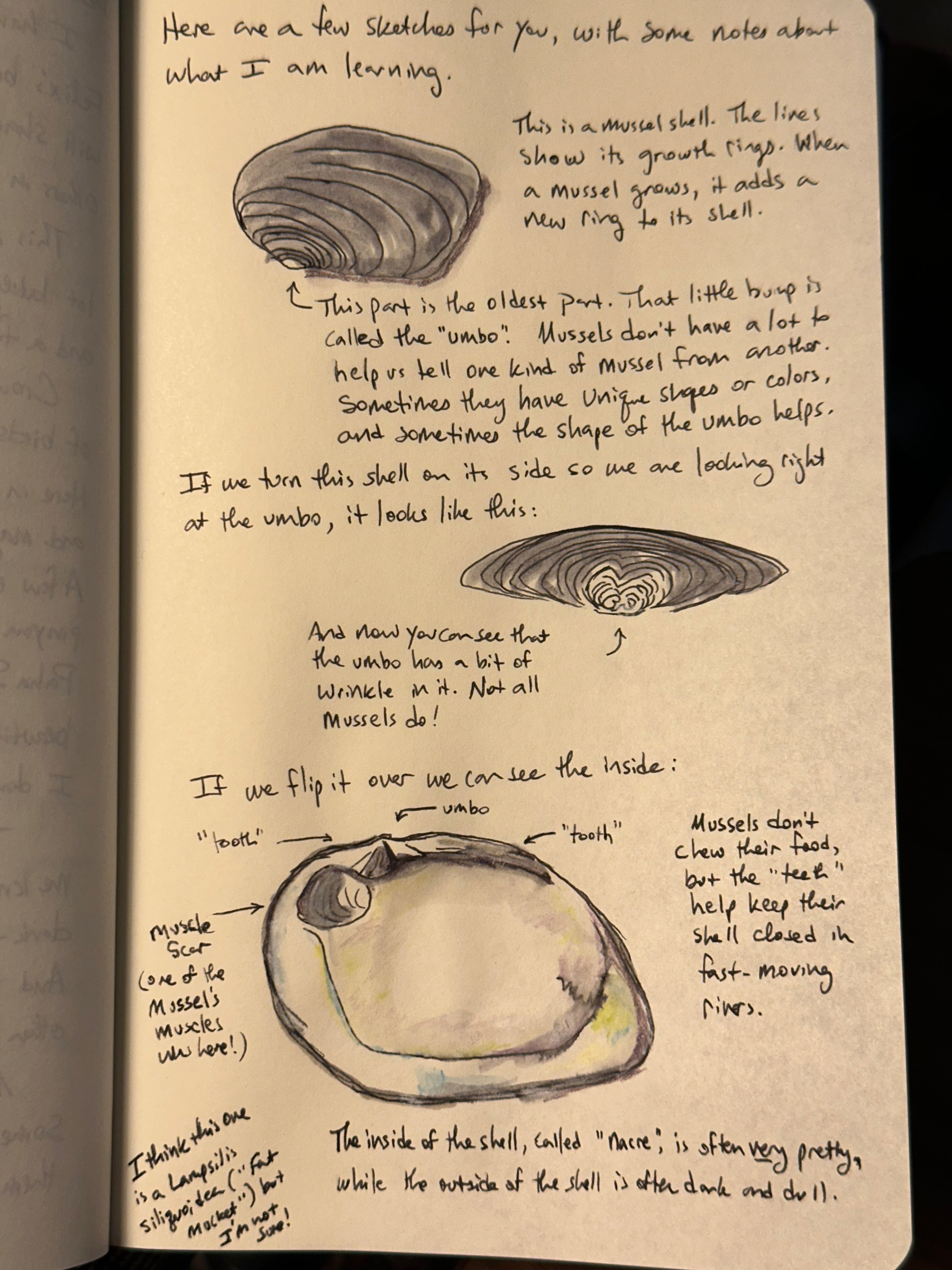
Corvids
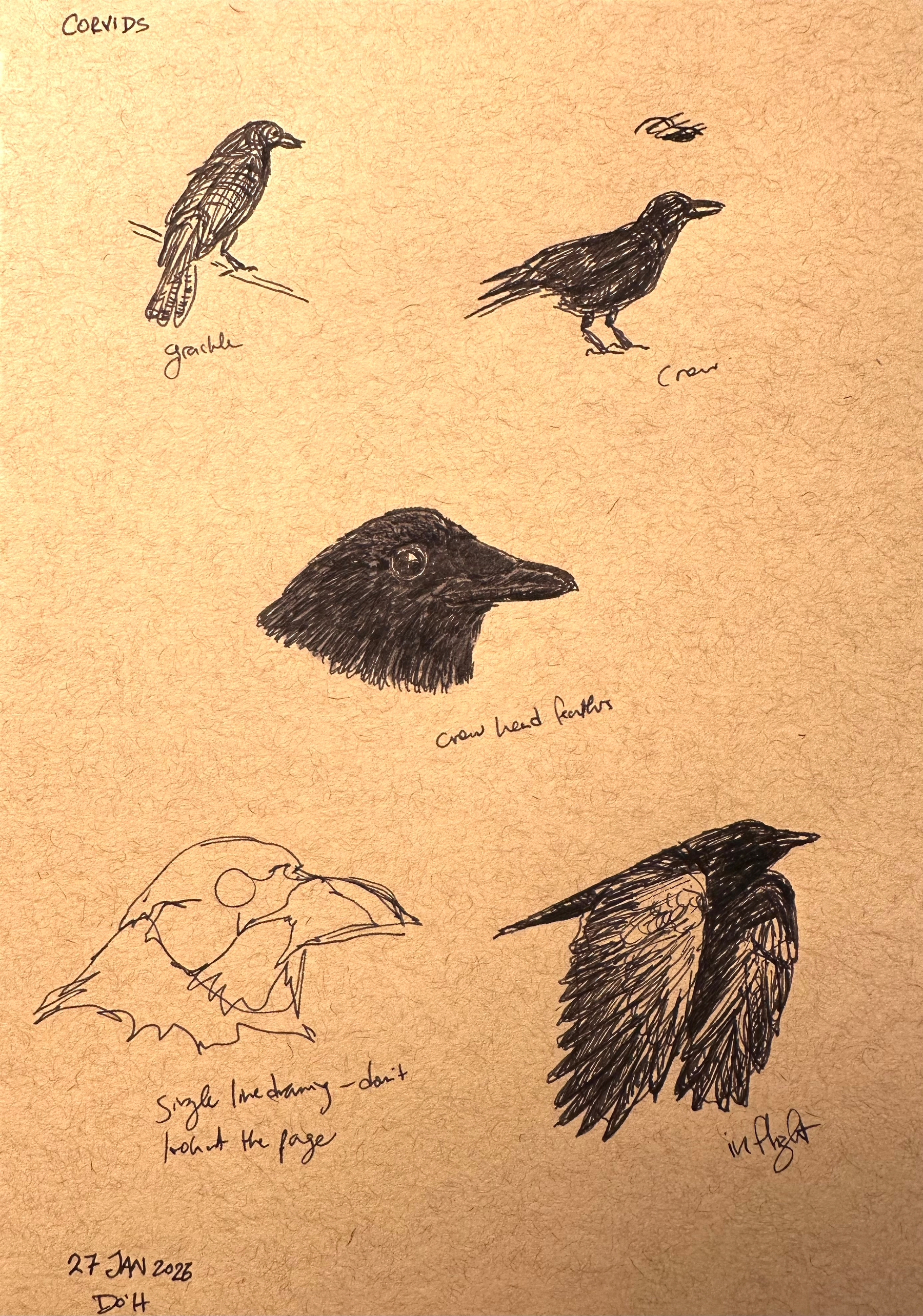
A morning corvid sketch.
I once asked someone named Crow how they got their name.
They replied “It’s a cool bird.”
I thought that was a pretty good answer.

Salt
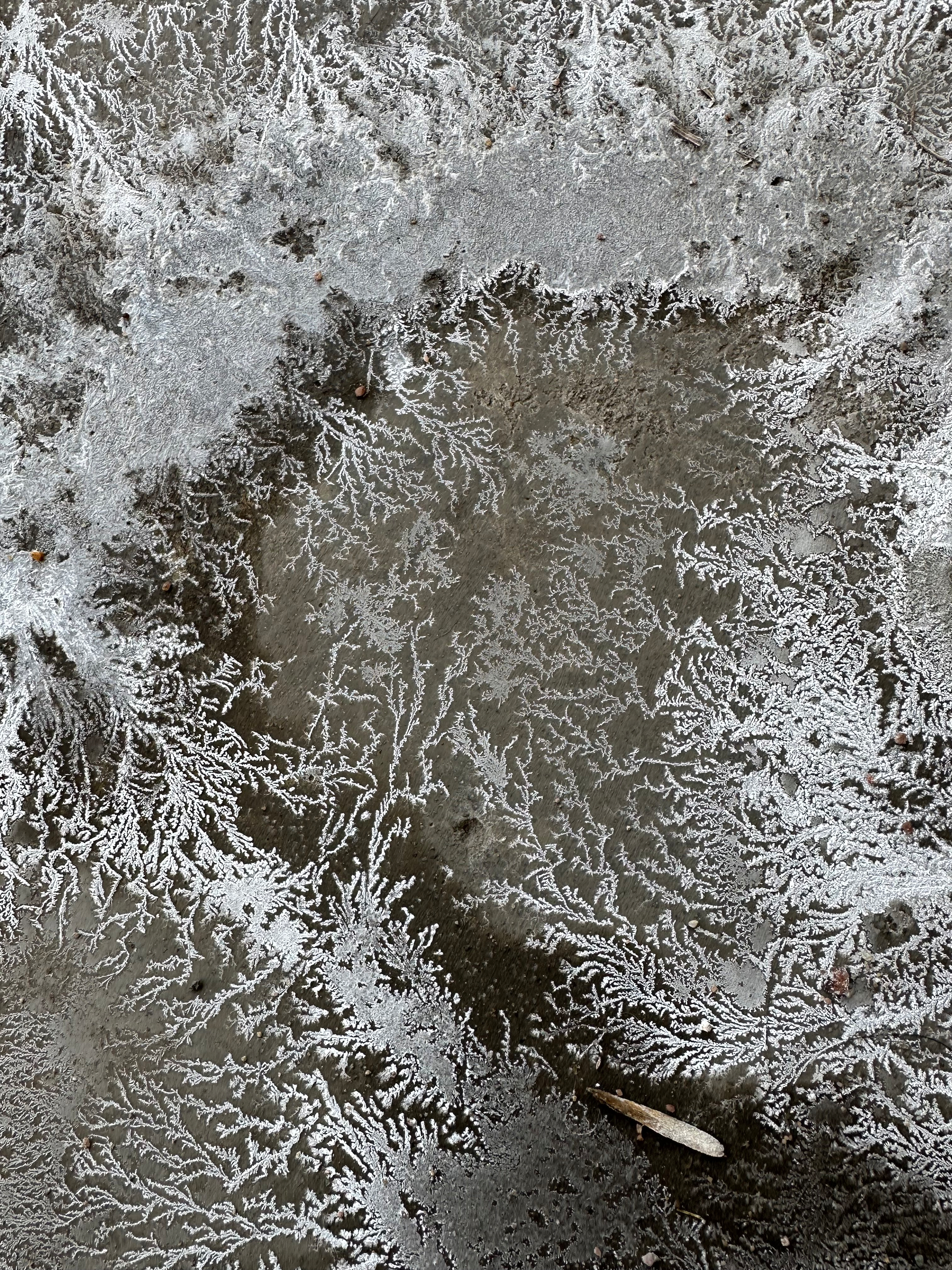
Teachers, Journalists, Lawyers
History shows that democracy is not protected by military strength. States? Sure. But not democracy itself.
Democracy depends on ideals, and on a mutually shared commitment to live according to them.
For a democracy to thrive it needs good teachers, free journalists, and attorneys committed to defending rights.
A merely militant state is one that is willing to declare exceptions to those ideals—often while paying lip service to the democracy that it ignores and often despises.
Ideals are not established or maintained by external force; they are learned by example and by long, costly practice and inner discipline. They are freely chosen, freely defended at personal expense.
Ideals that are imposed on others don’t take root. What a community can do to foster those ideals, exposing people to examples of the best we know, rather than imposing a rigid mandate.
What a community needs is people who will teach those ideals. Not rote memorization, but conversation, contemplation, and commentary—the slow, costly practice of considering the best stories we can gather. What do they tell us? How do we weigh their lessons? How shall we live, knowing the stories others have told? These are not light matters, and they’re not something that can be done quickly. This is a lifelong discipline, just as democracy is. There are no shortcuts.
Journalists also are storytellers. Those who attack journalists and the media they work for indirectly acknowledge the power of journalism, and of stories. Free press means we don’t just look backwards at the stories that have been told. The press tells the story of right now. No journalism is perfect, but we are better with many people exercising the right to free press than we are with a constrained press. A government that attacks the press—in words or, as we have seen too often recently, with physical violence—is a government that winces at the freedom of the people, that frets over the inconvenience of having to act in the light of day. Sunlight is the best disinfectant, and those who fear it most are the parasites.
The defense attorneys and litigators draw on our best stories and on the stories of right now to ensure that the story we tell tomorrow is at least as just as the one we tell today. They use the courts to hold the powerful to account.
Don’t get me wrong: you and I both know that there are bad teachers, bad journalists, bad lawyers. But we are better off with all of them than with none of them.
So if you see a government attacking teachers, journalists, and lawyers, what you are seeing is a government that fears the stories of freedom that invite us to our best ideals. What you are seeing is a government that fears being compared to the good, the true, the beautiful. What you are seeing is a government that knows that the sunlight that makes good things grow is the same sunlight that destroys the parasites that erode the foundations of democracy.
Study Abroad Journals
Yesterday I met with two colleagues to plan courses abroad for the coming academic year.
In all my courses abroad I require students to keep detailed journals that include both text and daily sketches.
Some balk at this requirement. I assure them I am not grading their art. Rather, I am helping them create something they’ll be glad they have forever.
I still have Mom’s journal from her 1959 travels in Europe with two classmates from Skidmore. What a treasure! Mom has been gone for fifteen years. Her handwritten notes have outlasted her mortal frame.
I’ve now taught something like thirty courses abroad in Poland, Greece, Italy, Spain, Morocco, the United Kingdom, Nicaragua, Guatemala, Belize, and Alaska.
Year after year students’ parents ask them to act as their tour guides. You studied abroad, and we have always wanted to see tha place. Can you show us around?
The students who keep journals are able to do so. They remember the names and addresses of hotels, restaurants, museums. They know how to find reliable guides, they remember the name of the person who helped them out in that distant city. They know the local food and when it is in season.
The ones who don’t keep consistent journals often come back to me and ask, can you remind me of the details of where we went?
To be clear: I always do. And I remind them to bring a good journal with them this time.
As my colleagues and I met yesterday I took out one of my sketchbooks and started to draw the table where we sat, and my colleague’s laptop. The visual practice deepens my memory and helps me to focus my attention.
Perhaps this practice can be helpful to you as well?
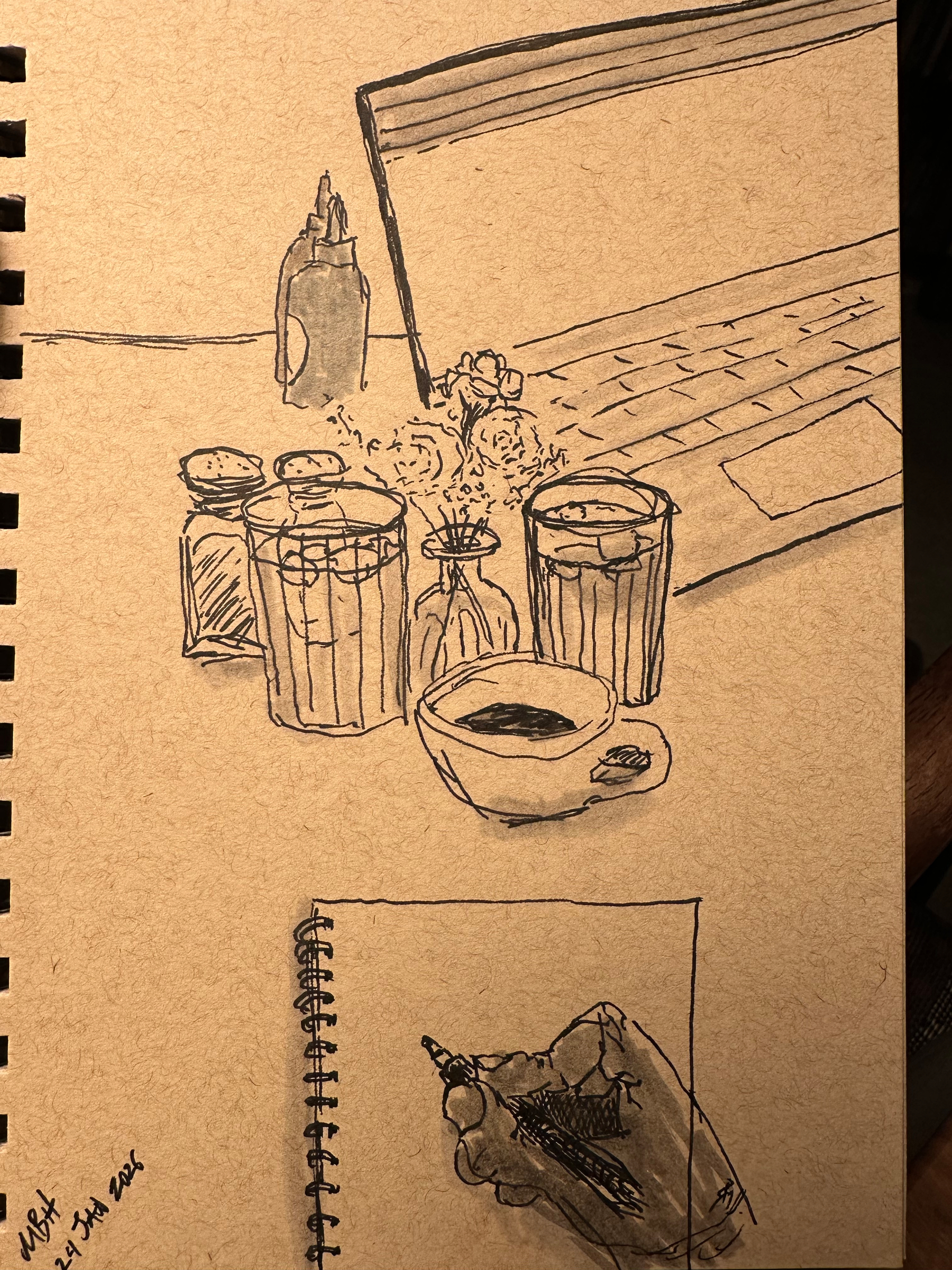
More birds
A few more birds to finish out the day. Gullor 616 Iridium on Strathmore toned tan paper.
I started carrying the spiral bound Strathmore paper a few months ago, and really like the texture and depth it lends to my sketches. Watercolors become more muted, and certain pencil colors like purple and white really pop.
As with so many of my recent sketches, my goals are:
- to sketch all the birds that frequent my campus
- to better understand the birds by paying attention to how they are structured
- to get just a little better at sketching each day through continuous practice
- to expand my skills with different tools and media.
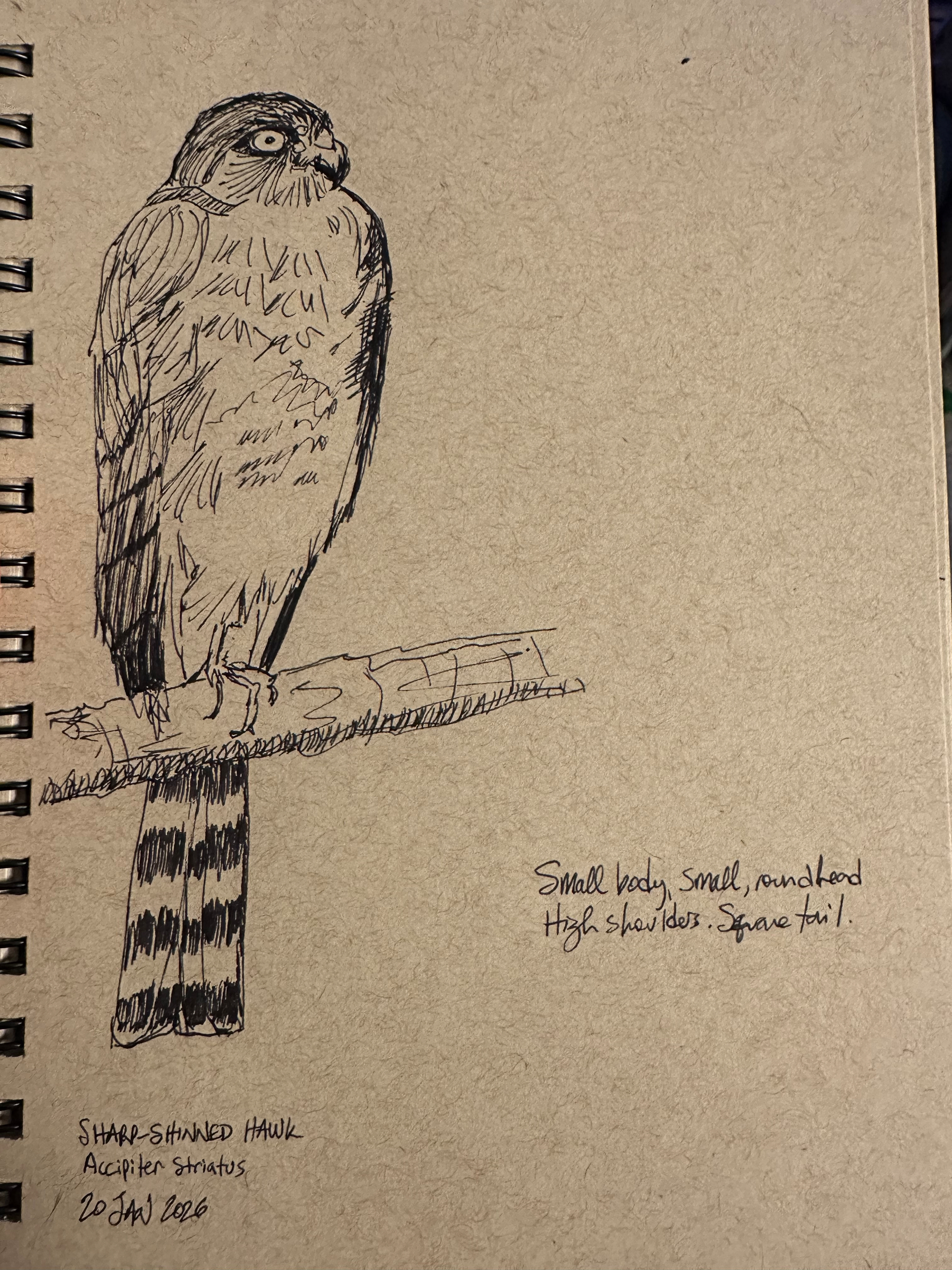
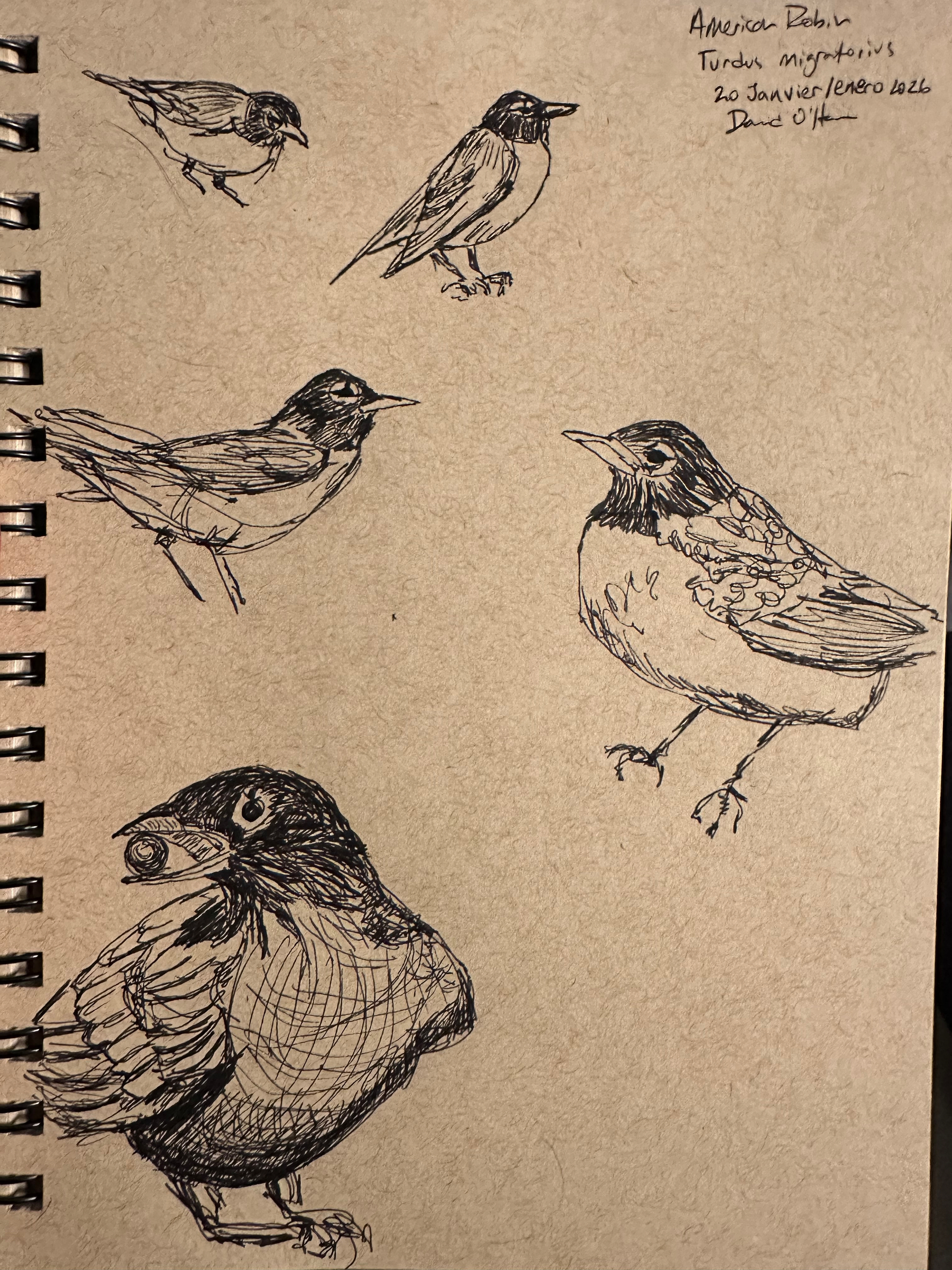
Pen, from the Latin for “feather”
Sketched more birds today, mostly trying to learn to recognize the differences between Sharp-shinned and Cooper’s hawks. They look so alike!
After some poor sketches, I switched to a new inexpensive fountain pen I got as a sketching tool: a Gullor 616 Iridium. It’s similar to the old Parker pens my grandparents kept in their writing desk. I filled it with some new Pelikan 4001 Brillant-Schwarz ink I got at Zandbroz (a local Sioux Falls gem, IYKYK) and tried a quick sketch of a belted kingfisher I photographed two weeks ago down by the river. Quite happy with how the ink flows, so this could be one of my new sketching tools.
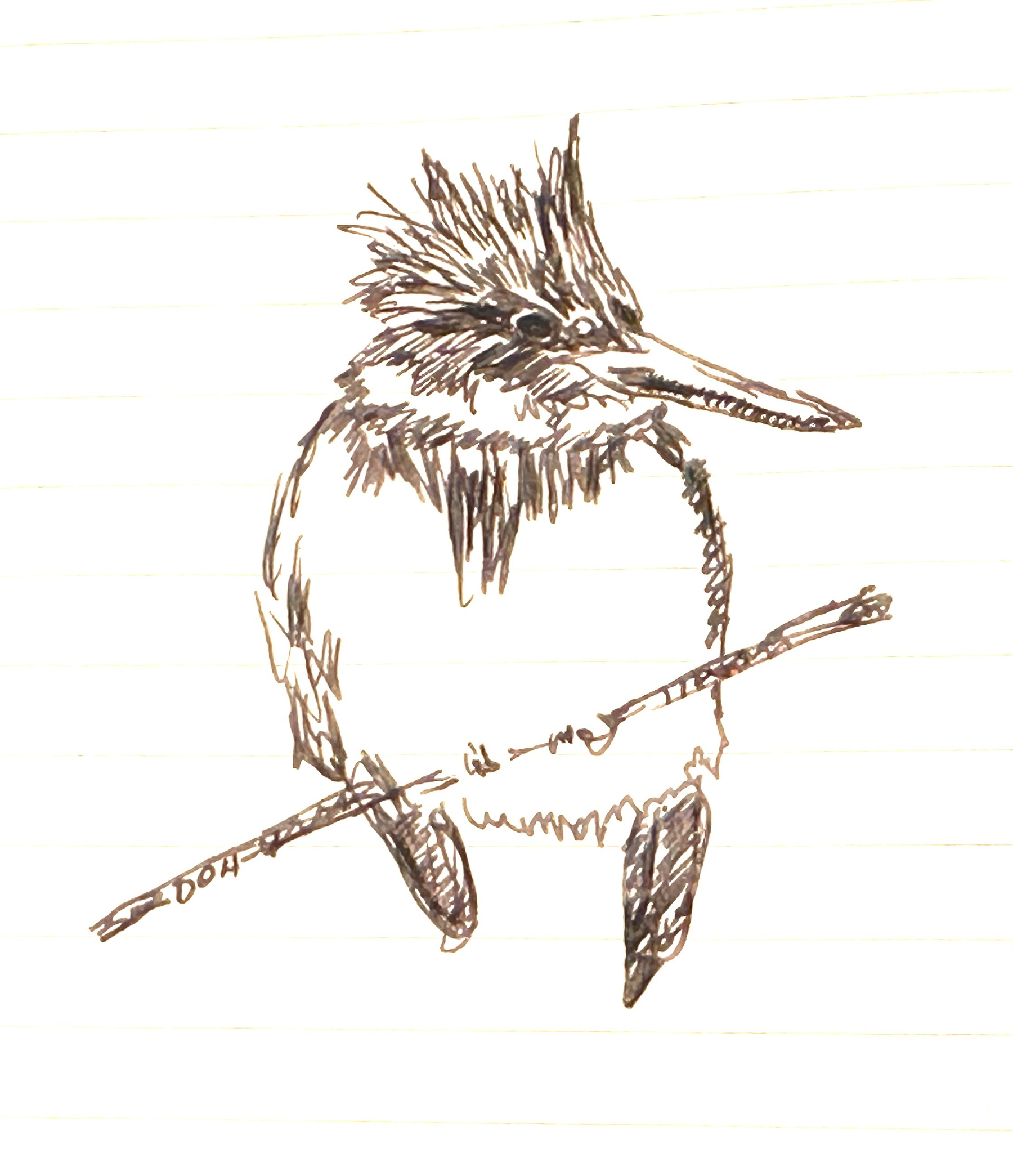
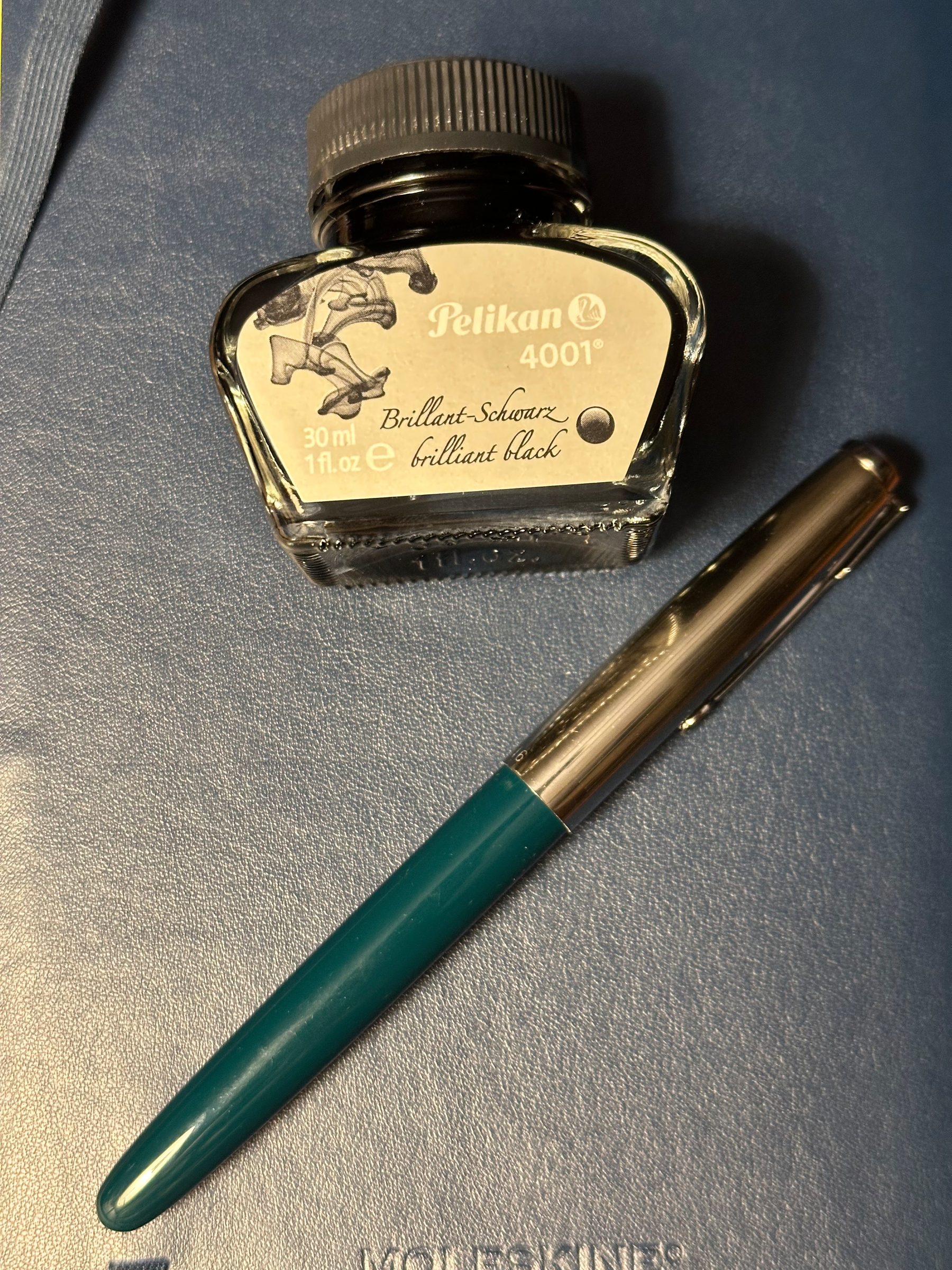
Does anyone read them?
Today I have written half a dozen letters of recommendation for my students. I know these students well and I take the writing of letters seriously.
But for the first time in three decades of writing these letters I am asking myself will anyone read them?
Three swallows do not make a spring
Last night’s idle paintings of barn swallows. Trying to capture their movement and to get a sense of muscle and bone deep beneath their sleek plumage.
Several swallow families spend the warm months living in holes in the side of a brick building right where I park each day. They catch insects over the campus ponds.
Painted with just two colors of Daniel Smith watercolor paint, Aquash water brush.
